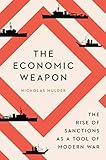The Economic Weapon : The Rise of Sanctions as a Tool of Modern War / Nicholas Mulder.
Material type: TextDescription: xiv, 434 pages : illustrations, maps ; 25 cmISBN:
TextDescription: xiv, 434 pages : illustrations, maps ; 25 cmISBN: - 0300259360
- 9780300259360
- 1900-2099
- Economic sanctions -- History -- 20th century
- Economic sanctions -- History -- 21st century
- International economic relations -- History -- 20th century
- International economic relations -- History -- 21st century
- War -- Economic aspects
- BUSINESS & ECONOMICS / Commerce
- Economic sanctions
- International economic relations
- War -- Economic aspects
- 327.1/170904 23
- HF1413.5 .M85 2022
| Item type | Current library | Collection | Call number | Copy number | Status | Date due | Barcode | |
|---|---|---|---|---|---|---|---|---|
 Books
Books
|
Zetech Library - Mang'u General Stacks | Non-fiction | HF1413.5 .M85 2022 (Browse shelf(Opens below)) | Available | Z012069 | |||
 Books
Books
|
Zetech Library - Mang'u General Stacks | Non-fiction | HF1413.5 .M85 2022 (Browse shelf(Opens below)) | C2 | Available | Z012068 | ||
 Books
Books
|
Zetech Library - TRC General Stacks | Non-fiction | HF1413.5 .M85 2022 (Browse shelf(Opens below)) | Available | Z011984 |
Browsing Zetech Library - TRC shelves, Shelving location: General Stacks, Collection: Non-fiction Close shelf browser (Hides shelf browser)

|

|

|

|

|

|

|
||
| HF1411 .P84 2016 International economics / | HF1411 .S239 2004 International economics / | HF1411 .S239 2004 International economics / | HF1413.5 .M85 2022 The Economic Weapon : The Rise of Sanctions as a Tool of Modern War / | HF1416.B72 1995 International marketing strategy / | HF 1416 .C375 2002 International marketing / | HF 1416 .C375 2002 International marketing / |
Includes bibliographical references (pages 299-416) and index.
Introduction : Something more tremendous than war -- The origins of the economic weapon -- The legitimacy of the economic weapon --Economic sanctions in the interwar crisis
Economic sanctions dominate the landscape of world politics today. First developed in the early twentieth century as a way to use the flows of globalization to defend liberal internationalism, their continuing appeal is that they function as an alternative to war. This view, however, ignores the dark paradox at their core: designed to prevent war, economic sanctions are modeled on devastating techniques of warfare. tracing the use of economic sanctions from the blockades of World War I to the policing of colonial empires and the interwar confrontation with fascism, Nicholas Mulder combines extensive archival research with political, economic, legal, and military history to reveal how a coercive wartime tool was adopted as an instrument of peacekeeping by the League of Nations. This timely study casts an overdue light on why sanctions are widely considered a form of war, and why their unintended consequences are so tremendous.
There are no comments on this title.

